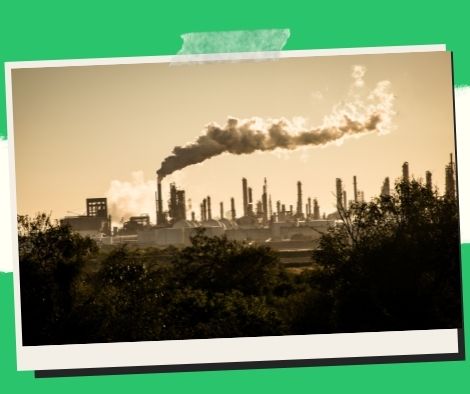
The conflict in Ukraine may cause the EU to miss its net-zero emission targets, according to experts.
ANKARA, Turkey — Aside from costing thousands of lives, the ongoing conflict between Russia and Ukraine has sparked concerns about the energy crisis and the possibility of net-zero targets becoming more distant globally.
According to an economic security analyst from Turkiye, countries that rely on coal may fall behind on their net-zero carbon emission ambitions as a result of these dangers.
Despite the fact that certain European Union countries rely on Russian gas, the union consumes a significant quantity of coal, notably in the Balkans, according to Levent Yilmaz, a professor at the Turkish National Police Academy.
According to Yilmaz, who is also a senior research fellow at the Oxford Centre for Technology and Development, this will necessarily result in variances in net-zero targets among such countries.
“The net-zero targets of nations that consume a lot of coal can’t be the same as those of countries who produce 60-65 percent of their energy from nuclear,” he explained.
However, comparing EU countries in the Balkans with those in Southern Europe may not be fair, according to Yilmaz, who claims that when the bloc is considered as a “energy union,” differing rates of reliance on different energy sources become obvious.
In comparison to the rest of Europe, the Balkans, eastern, and southeastern European countries are likely to lag behind on their net-zero ambitions.
The Obstacles to Green Transformation
Transitioning to green energy will be difficult, according to Yilmaz, who estimates that for every $1 million in fossil fuels to be replaced, ten times that amount in renewable energy will be required.
Such high expenses will be particularly burdensome for the globe as it navigates through the current difficult economic conditions, particularly in the aftermath of the coronavirus disease 2019 (Covid-19) pandemic strains.
Additional costs will be incurred as a result of the conflict in Ukraine. “It’s possible that accomplishing the net-zero targets will take longer than expected. As Europe replaces Russian gas, it may face extremely costly situations “Yilmaz continued.
Gas costs are ‘very high.’
According to Yilmaz, as part of its efforts to lessen its reliance on Russian gas, the EU has resorted to liquefied natural gas (LNG).
However, the bloc’s LNG supplies are not very diverse, with 70% of its purchases coming from three countries: 26% from the United States, 24% from Qatar, and 20% from Russia.
“In other words, Europe is buying LNG from Russia in order to reduce its reliance on Russia,” he explained.
Yilmaz warned that because EU countries tend to stock up on natural gas during the summer months when demand and prices are lower, they may have to pay higher rates this year to replenish their stocks.
“If they don’t get LNG, which accounts for 20% of their imports, this might result in astronomically high natural gas prices, not just in Europe, but also in China and Latin America,” he warned.
He also stated that the possibilities of Europe overcoming its “severe challenge” of energy supply in the near future appear to be poor.
Europe’s energy requirements in the foreseeable future
The Green Transformation’s pressure has been felt in the energy sector, according to Yilmaz, who noted that the pandemic’s economic impact was already “devastating” before the Russia-Ukraine conflict erupted.
“Since Covid-19 turned the energy market upside down, we’ve seen a decline in investments in this industry, particularly in natural gas and oil exploration and transmission,” he said.
One of the most significant reasons for this drop is the EU’s aspirations to leave fossil fuels, as it is one of the world’s most energy-demanding regions, according to Yilmaz, who added that the war may bring some modifications, like as a decision to postpone the bloc’s Green Deal.
“We’ve seen the European Commission postpone coal choices, modify nuclear decisions, and extend the cycle of gas-fired power plants for a bit longer on occasion.”
“For the time being, the EU appears to be keeping to the Green Deal plan,” the researcher noted, “but acts thus far imply that the calendar may alter.”
According to Yilmaz, when the bloc rebuilds its security architecture, additional studies on economic security, including energy demand security, will be conducted.
He stated that the bloc’s energy crisis will persist, at least for the time being, and that its objectives may change regardless of the course and outcome of the war in Ukraine.
The importance of Turkiye in Europe’s push for net-zero energy
Turkiye can play an important role in the EU’s attempts to attain net-zero as a major trade hub that can help to reduce Europe’s reliance on Russian gas, according to Yilmaz.
He emphasized that the country is a “essential doorway” for achieving net-zero ambitions in Europe, both in terms of energy diversification and price stability.
“Turkiye has the potential to become a significant source of clean energy for Europe. Turkiye can export energy to Europe using renewable energy “He went on to say that the country can greatly expand its present clean energy infrastructure in the long run.
Turkiye must be treated more fairly.
To achieve headway toward its net-zero targets, Europe will need to treat Turkiye more fairly, according to Yilmaz.
“In terms of European energy demand security and price security, Turkiye is a critical country. During (Turkey’s) EU negotiations, however, there were no discussions about energy. They are attempting to downplay Turkiye’s potential “he stated
Various difficulties will certainly arise in the future and have an impact on EU energy policy, according to Yilmaz, who noted that one of them might be a prospective arrangement to transit Israeli gas to Europe via Turkiye as the two countries’ relations improve.
An increased role for gas from Iran and northern Iraq, both of which are Turkiye’s neighbors, and growing US leniency in its sanctions against Tehran as it tightens the screws on Russia will also boost Ankara’s importance in terms of EU energy security, as will the possibility of Turkmenistan sending gas to Europe via Turkiye.
“These facts demonstrate that the EU will be unable to solve the problem without Turkiye’s participation. However, Turkiye has been treated unfairly for a long time.”
Save/Share this story with QR CODE
Disclaimer
This article is for informational purposes only and does not constitute endorsement of any specific technologies or methodologies and financial advice or endorsement of any specific products or services.
📩 Need to get in touch?
📩 Feel free to Contact NextGenDay.com for comments, suggestions, reviews, or anything else.
We appreciate your reading. 😊Simple Ways To Say Thanks & Support Us:
1.) ❤️GIVE A TIP. Send a small donation thru Paypal😊❤️
Your DONATION will be used to fund and maintain NEXTGENDAY.com
Subscribers in the Philippines can make donations to mobile number 0917 906 3081, thru GCash.
3.) 🛒 BUY or SIGN UP to our AFFILIATE PARTNERS.
4.) 👍 Give this news article a THUMBS UP, and Leave a Comment (at Least Five Words).
AFFILIATE PARTNERS

World Class Nutritional Supplements - Buy Highest Quality Products, Purest Most Healthy Ingredients, Direct to your Door! Up to 90% OFF.
Join LiveGood Today - A company created to satisfy the world's most demanding leaders and entrepreneurs, with the best compensation plan today.



 Business Technology, Finance Technology & Information Technology
Business Technology, Finance Technology & Information Technology





